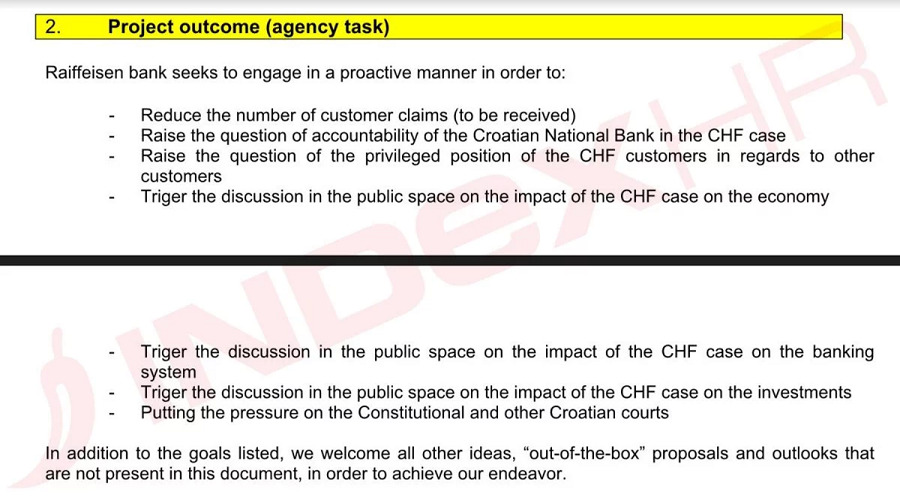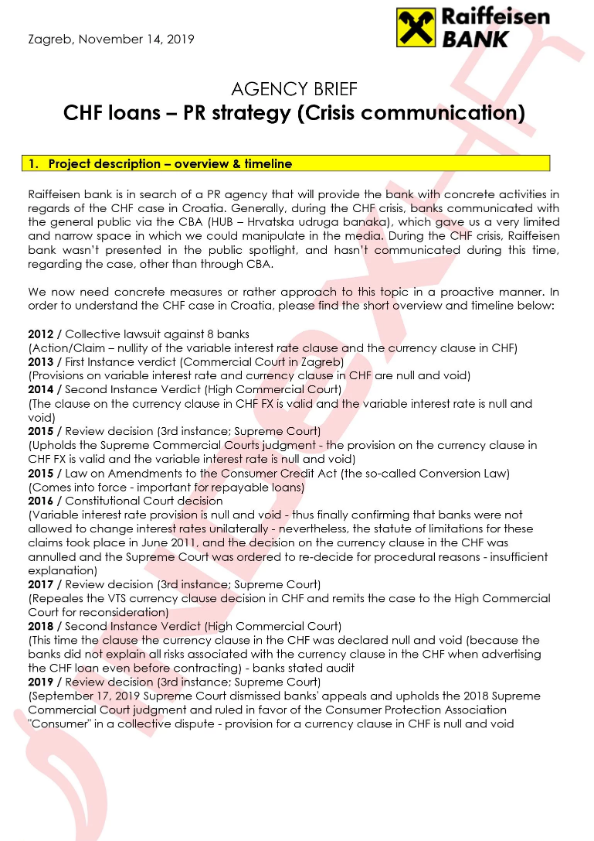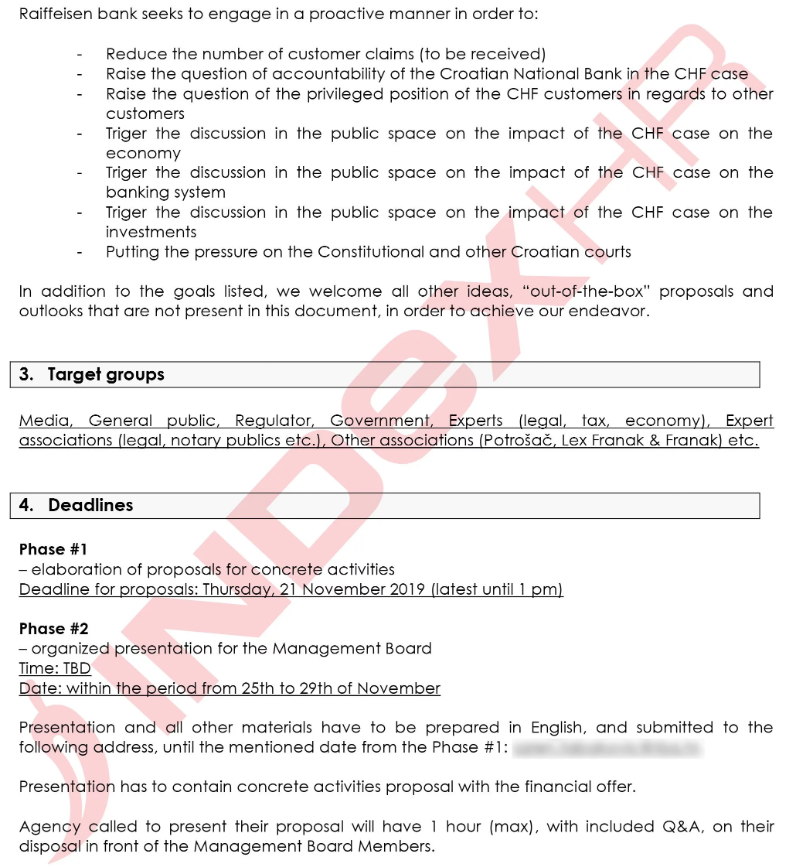As Index writes on the 22nd of January, 2020, the chairman of the board of Raiffeisen Bank (RBA) resigned after the uncovering of an affair originally announced on Index Investigations/Index Istrage. As Index found out, RBA was seeking a PR agency to put pressure on the Constitutional Court and other Croatian courts, which is illegal.
Michael Müller has now resigned as CEO of RBA, regarding the negative public perception of the invitation to the controversial PR agency tender. RBA issued a press release:
Raiffeisenbank Austria d.d.: Michael Müller resigns as CEO
Today, Michael Müller resigned as CEO of Raiffeisenbank Austria d.d. on his own request following negative media coverage regarding a briefing document for Public Relations agencies.
“I acknowledge the strong negative sentiment towards Raiffeisenbank Austria and its management. However, the briefing in no way reflects the intention of RBA’s management. As a professional manager I decided to step down to prevent further reputational damage for the bank,” Michael Müller said.“
I accepted Michael Müller’s resignation as a sign of his responsible attitude and would like to thank him for his long-time service with Raiffeisenbank Austria and the RBI Group. Both RBI and Raiffeisenbank Austria stand for lawfulness, high ethical standards and trust,” said Andreas Gschwenter, President of Raiffeisenbank Austria’s Supervisory Board and Member of the Management Board of the bank’s parent company Raiffeisen Bank International (RBI).
Liana Keserić, a very experienced member of the management team of RBA, will act as interim CEO subject to the approval of the authorities.
The media investigation which led to Müller's resignation is translated in full below:
As Istrage/Ilko Cimic/Index writes on the 19th of January, 2020, for the selection of a PR agency by Raiffeisen Bank (RBA), in which the aforementioned bank sought crisis communication services over the Swiss loan case, one of the desired agency's tasks was to "exert pressure on the Constitutional and other courts in Croatia". Quite literally.
Under Croatian and international law, any pressure on the judiciary, that is, on judges, is strictly prohibited, and the European Court of Human Rights has already overturned Croatian judgments on suspicion of pressure from both the public and interested parties.
Although the letter/call, which is written in English, says to ''put pressure on the Constitutional and other Croatian courts", in its statement to Index, RBA claimed that "solely solutions containing legitimate actions" were sought.
Attorney Nicole Kwiatkowski, the co-author of a collective lawsuit against eight banks in the Swiss case, said it was an inadmissible practice that could have an impact on the final judgment. Goran Aleksic, a SNAGA member of parliament and an activist of the Franak Association, claims that it is an illegal attack on an independent judiciary and clear evidence that Croatian banks are not afraid of anyone.
But let's not get ahead of ourselves just yet.
How did it all begin?
Last September, an important verdict was passed by the Supreme Court, which ruled that the banks had violated the collective interests and rights of credit users contracted in Swiss francs. According to this ruling, all eight Croatian banks were found guilty of unlawful and dishonest treatment. It is a final judgment after which debtors can claim repayment of the overpaid loans in Swiss francs, but in individual court proceedings.
The banks were left to address the Constitutional Court and possibly initiate proceedings at the European level. Additionally, a judgment of the Supreme Court is now awaited, which has yet to decide whether a contract with a currency clause in Swiss francs is void.
In the middle of November last year (more precisely November the 17th, 2019), RBA sent some PR agencies a tender, ie, a call for selection, a so-called pitch, in which they sought out crisis communication services. RBA's main agenda was to reduce the number of appeals, to open up the issue of the Croatian National Bank's liability in the Swiss case, to launch a debate in the public space on the impact of the Swiss case on the economy, and more.
At the bottom is a request to put pressure on the Constitutional Court and other courts in Croatia (Literally, and in English: Putting pressure on the Constitutional and other Croatian courts). RBA hasn't denied that it sent the call out to PR agencies.
RBA stated that they wanted a PR agency to provide them with better visibility in the media.
"In view of the current topic of the Swiss franc loans, RBA decided to call for a PR agency in order to promote the views of the bank in the public and media space,'' they say from RBA in response to an Index inquiry.
What is of particular interest is the way in which the Croatian judiciary, ie the Croatian courts, were supposed to be put under pressure, which is explicitly mentioned in the call to the PR agencies in English. Keep in mind that influencing courts or the judiciary in Croatia is completely and utterly illegal.
RBA claims that only solutions containing ''legitimate practices'' were sought.
"RBA adheres to all of the laws and regulations of the Republic of Croatia in its business operations, including the case for the tender you're referring to. Only solutions containing legitimate procedures and communication activities that would reach the public through the media were sought," RBA told Index.
Following that answer, Index asked what these legitimate procedures for pressuring the Constitutional Court and other courts in Croatia would be, and whether these legitimate procedures were established by law, given that RBA was urged to "comply with all of the laws and regulations of the Republic of Croatia". Index asked them what specific regulations or laws they were referring to in this case.
"RBA is not engaged in any of the activities that you're suggesting. The tender sought the service of developing a communication strategy and key messages," RBA responded, adding that no agency was selected for these type of activities.
Kwiatkowski claims that this is inadmissible and illegal.
Lawyer Nicole Kwiatkowski was surprised when Index asked her for comments on RBA's tender.
"Any pressure on the courts is unacceptable on any side. Such behaviour is completely inappropriate. Croatian and European case law is full of examples of the rescission of judgments and the reopening of court pressure proceedings,'' Kwiatkowski told Index, adding that there were various options for so-called lobbying in an appropriate manner, from organising public hearings and engaging the professional public, but any pressure is totally unacceptable.
"All of this surprises me. Okay, we expect heightened media coverage, literacy tributes and some action, but something like this... no. I'd like to say that this is happening at a time when we have a final judgment of the Supreme Court where users of these loans are allowed to claim compensation through individual cases, which is an extremely important point. I emphasise that any pressure is unacceptable and illegal,'' says lawyer Nicole Kwiatkowski.
Index then asked Goran Aleksic, an MP for SNAGA and an activist of the Franak Association, if he had any knowledge that the banks had been pressuring the courts.
"Banks have been doing this sophisticatedly for a very long time. They do it primarily through ''their'' journalists in ''their'' media, but also through ''their'' law professors. I will not say what kind of media this is, but I will say how it works.
Each time something with franc case was dealt with, spins would start in some media, which could be summarised in the following statements: ''What do they want, they were greedy and now they complain; they were economically illiterate; they made fun of those of us who raised euro loans; now they're acting stupid as if they don't know that currency can grow on the exchange rate; the banks are not guilty, variable interest and currency clauses are allowed,'' and the like," explains Aleksic.
"If pressure is being exerted directly on the judges, I can't really say, but I suppose that e-mails are sent to the judges with certain ''expert'' papers from some ''experts'' who agitate for banks. The last example of ''expert'' agitation is the case of Professors Petrovic and Jaksic, who publicly stand in favour of banks, claiming that debtors with converted loans have nothing more to seek because they've been indemnified, and Professor Petrovic even writes expert opinions on bank defense filings in the courts. But, I have to say that I believe in the independence of the judiciary, and I believe that a large proportion of judges will not be affected by such spins,'' says Aleksic, noting that the vast majority of first-instance judgments for converted loans are for the benefit of the consumers, and many judges correctly understood the judgment of the EU Court of Justice C-118/17.
Aleksic says that it is difficult for him to be surprised by anything when it comes to banks, even the idea of them trying to put pressure on the Constitutional Court and other Croatian courts.
"The banks no longer surprise me. The concrete formulation you mention is unmistakable - it calls for pressure on the Constitutional Court and other courts to release banks from liability and blame. This is an attack on an independent judiciary, and an illegal attack. I'm amazed that they've formulated such wording in their official document, and if it is official, the banks don't appear to be afraid of anybody. The Croatian National Bank, the Government of the Republic of Croatia and the Croatian Parliament are to blame for such actions,'' says Aleksic.
"For now, the state is doing nothing about it, the banks are still acting as if they've not been convicted at all, they're still lying about how their business was in line with the law, and at the same time they're asking the state for damages in Washington. The banks are the holy cow for the Croatian National Bank and the Government of the Republic of Croatia. This is a national embarrassment. The courts remain the last line of defense against thieves and I believe that in the first half of 2020 all remaining legal dilemmas will be resolved in the franc case, after which I hope for the general mobilisation of all robbed citizens towards the courts with the aim of being repaid, all together the banks need to return around 25 billion kuna of stolen interest and stolen Swiss franc growth. Minister Darko Horvat announced the strengthening of consumer protection as part of the presidency of the EU Council, so we'll see if he's serious, or if it's just a cosmetic statement because of the EU Commission, which truly advocates for consumer rights,'' Aleksic concludes.
The banks were warned against unlawful pressure on judges, but by the Franak Association.
There were also accusations of pressure on judges. For example, the Croatian Banking Association accused the Franak Association of unlawful pressure on judges throughout the Republic of Croatia and the Supreme Court. Specifically, they resented the individual publication of judgments that went in their favour. The last such announcement by the Croatian Banking Association dates from April last year, following the Supreme Court ruling in favour of the Franak Association.
"The ruling of the Supreme Court of the Republic of Croatia published today speaks exclusively about the consumer's legal interest in judicial protection and the admissibility of trials. This judgment does not in any way direct the lower-level courts to decide on individual actions in connection with the lawsuits filed, and especially not in relation to converted loans under the Consumer Credit Act, as would be deduced from today's media appearances,'' they stressed from the Croatian Banking Association, making accusations of unlawful pressure on the courts because they said they were ''manipulating the media using the verdict" as a prejudice to the final outcome.
Make sure to follow our dedicated news page for more on the unfolding situation with RBA.





